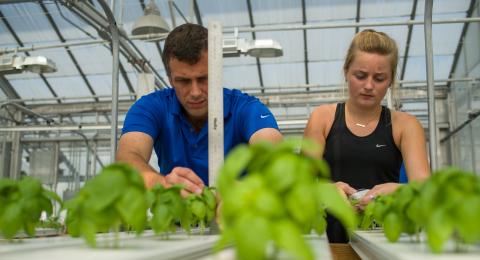The Horticulture minor at UNH integrates a deep appreciation of plant cultivation with a focus on addressing global challenges. You’ll learn to innovate in food production, landscape management, and conservation efforts. This minor not only offers technical skills in growing diverse plant types but also fosters an understanding of how these practices can lead to more sustainable and efficient resource use.
What is horticulture?
Horticulture explores the science and art of cultivating plants and the many ways that plants enhance the human experience. The cultivation of fruits, vegetables and ornamental plants is key to solving many of the major challenges facing the world, such as producing food to meet the needs of an ever-growing population while conserving land, water and soil resources. An understanding of these challenges and potential solutions can enhance any career.
Why study horticulture at UNH?
The horticulture minor will give you knowledge and experience in modern horticulture techniques and approaches. You’ll be exposed to cutting-edge research in areas such as horticultural cropping systems, plant pathology, integrated pest management and plant breeding. You’ll also be able to gain hands-on experience in the Macfarlane Research Greenhouses, and at the Kingman and Woodman horticultural research farms.
Potential career areas
- Business management
- Extension education and outreach
- Fundamental and applied research in plant biology
- Greenhouse management
- Horticultural crop production
- Landscape design
Curriculum & Requirements
Through completion of the horticulture minor, students gain practical, well-rounded knowledge of horticultural production systems. The required Introductory Horticulture course provides the necessary foundation in theoretical and applied knowledge in the plant sciences for the minor. Students then gain more in-depth knowledge by taking additional coursework focused on botany, various specific crop production systems, or integrated pest management strategies.
Our horticulture students study the science and art of cultivating plants and the many ways that plants enhance the human experience. The cultivation of fruits, vegetables, and ornamental plants is key to solving many of the major challenges facing the world, such as producing food to meet the needs of an ever-growing population while conserving natural resources and promoting human wellness. An understanding of these challenges and their potential solutions can enhance any career, and a minor in horticulture may complement any major field of study.
Academic policies related to Minors.
| Code | Title | Credits |
|---|---|---|
| Required Courses | ||
| AGFS 421 | Introductory Horticulture | 4 |
| Electives | ||
| Select 16 credits from the following courses: | 16 | |
AGFS 403 | Green Thumb Workshop | |
AGFS 405 | Sustainable Agriculture and Food Production | |
AGFS 410 | A Taste of the Tropics | |
AGFS 601 | Fruit Crop Production | |
AGFS 632 | Urban Agriculture | |
AGFS 651 | Plant Pathology | |
AGFS 679 | Food Production Field Experience I | |
or AGFS 680 | Food Production Field Experience II | |
AGFS 689W | Greenhouse Management and Operation | |
AGFS 760W | Integrated Pest Management | |
AGFS 795 | Investigations (Horticulture related topics) | |
BIOL 409 | Green Life: Introducing the Botanical Sciences | |
BIOL 566 | Systematic Botany | |
BIOL 704 | Plant-Microbe Interactions | |
| Total Credits | 20 | |













